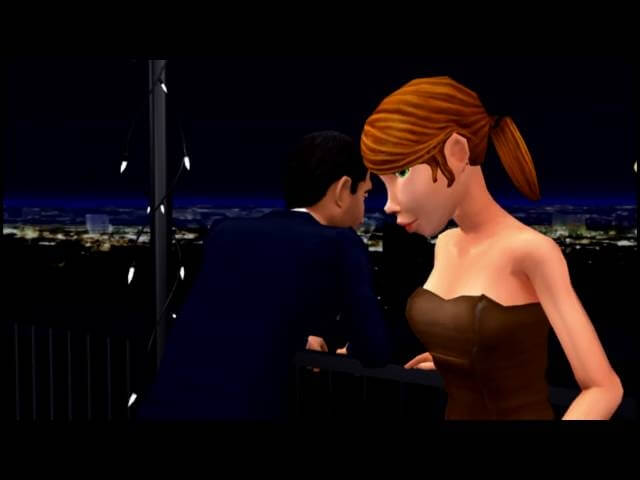The Bachelor video game simulates the most miserable parts of dating

“Love is a battlefield.” —a very confused military tactician
Looking for love is horrible. You have to find a cool person. Someone you want to spend a lot of time with. And they have to feel the same way about you. Then you have an amazing date, maybe. Followed by a lack of communication, maybe. There are so many variables at play—timing, odor—that even though it might feel like it helps to, say, pound the OkCupid “pavement,” it’s still impossible to know when you’ll meet that right person. It’s easier and more realistic to give in to fate—relax and let all the deciding factors sort themselves out. That triumphant moment of mutual love will come.
Of course, it’s hard to remain relaxed and optimistic when your latest romantic prospect flickered across your phone screen for all of two seconds before you swiped him or her away on Tinder. That may speak to why The Bachelor and The Bachelorette have held high ratings for their entire decade of existence. It’s a reality show that demystifies love by giving it a clear beginning, middle, and end. The eligible single seeking romance meets the prospects, they get to know each other on group horseback riding dates, and by the end, one person emerges victorious, to live happily ever after until the tabloids descend on their relationship.
With the exception of only one of the shows’ combined 26 seasons, the finale delivers on the promise of televisually engineered love. It’s a given. Advertisers are depending on it. Sure, the shows are formulaic—booze + hang-gliding = probably making out—but it’s easy to overlook the manipulation when the guy gets down on one knee and proposes. Emotional investment is directly proportional to willful ignorance.
Not so in The Bachelor: The Videogame, released in 2010 for the Nintendo Wii and DS, where ignorance is virtually impossible. On the show, you watch people fall in love based on qualities that can’t be quantified, like conversational depth and natural charisma. In the game, everything is quantifiable. It’s easy to know who won the motocross race that you and your fellow contestants undertake in the middle of a supposedly romantic evening. And winning that race brings you that much closer to a lifelong love. If there’s one thing dating didn’t need, it’s more metrics by which to measure success and failure. In this game, it’s mostly failure.
On the Wii’s version of The Bachelor, optimism is only as powerful as your trigger finger. Each round is divided into a series of mini-games that stand in for the television show’s dates as seamlessly as a Teddy Ruxpin doll might stand in for your therapist. They are simple exercise that test one of five basic motor functions, repeating themselves in different situations but essentially boiling down to the same patterns. (Hey, just like real dating!) You are awarded heart points for successes, and every point increases your chances of getting lucky, as indicated by a cutscene of you stoking sensuous flames in a fireplace.
The video game’s dates make you work for your moments of virtualized pleasure. One premise: The bride-to-be wants to go on a hot-air balloon ride. But wouldn’t you know it, all the hot-air balloons are deflated. What’s a girl to do? Luckily, you and your male avatars—which are metrosexualized within an inch of their lives—are around to pump those balloons full of hot air. The task itself, finessing the timing of a button push, is more mentally taxing than even the worst dates I’ve ever been on. The escapist version is more miserable than the real thing.
As you’ve probably figured by now, the whole game is an elaborate framing device for lots of mini-games that would find a home on a Megatouch bar console or perhaps somewhere in the “free” section of the iTunes App Store. That’s not a revolutionary idea, but where the Mario Party series might use game-ettes just to foster friendly competition among friends—without worrying about the “why” of each activity—The Bachelor keeps the emphasis on the date itself. How’s it going? Will you make it through to the next round? And so on. Filling up the hot air balloon is not something to enjoy, it’s something to be finished with.
At least this particular challenge has some practical value in the game’s world. Her balloon is out of hot air, after all! It’s a true plumber-meets-princess tale. It’s also a rare exception. Other challenges ask you to recite trivia about blurry photos, play a thrilling game of feather catch, or complete one of the most complex mathematical tasks I’ve seen since college—ice skating. These have only minimal relevance to the date, or to anything. The more The Bachelor tries to simulate the pursuit of love, the more tenuous the connection becomes between what you’re actually doing and how it impacts your digital romance.
No one’s arguing that The Bachelor TV show is Romeo And Juliet; it’s not like the show itself is a sensible portrayal of romance. But the fascinating thing about reality television is that even though the viewers know it’s all bullshit—and the people making the show know the viewer knows—the viewers show up anyway. The show’s blatant artifice wins them over. The marriage proposal at season’s end is a moment of love to trump all the gimmicky trials that came before it. But the game doesn’t get the benefit of rose-tinted glasses. The tasks themselves are the focal point, so the end doesn’t bring triumph, only relief.
Fleeting relief. Moments after ostensibly finding “The One,” the game starts over again, this time with a completely different person waiting at the end of the grueling, maniacal trials. To start over is to admit defeat on your previous relationship. In trying to mimic love, The Bachelor game inadvertently recreated the worst part of dating: failure. And, of course, the games.